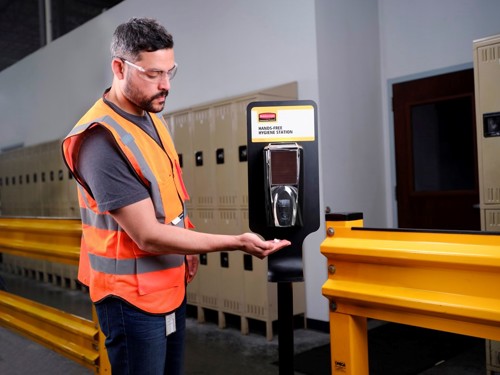This year marks three years since countries across Europe first went into national lockdowns to help prevent the spread of the COVID-19 virus. During that time the world and our behaviours changed in ways nobody expected: people were working from home, nobody was travelling, and good hand hygiene had become a central pillar of COVID-19 prevention strategies. But with the benefit of three years of hindsight, how have things changed? The threat of COVID-19 may not be as strong but with the spread of other illnesses still a risk, and potentially serious commercial implications for your business, having exceptional hand hygiene practices is still as important as ever.
THE HYGIENE HANGOVER
The global pandemic thrust hand hygiene into the spotlight, it’s therefore hardly a surprise that the pandemic was a direct cause for people washing their hands for longer, more thoroughly and in new situations1. But did the pandemic increase our awareness of the importance of good hygiene habits beyond COVID-19?
Let’s take a closer look at some pre-pandemic and post-pandemic hand hygiene practices. Before the pandemic the average handwash lasted 13 seconds and was carried out five times per day, this has now increased to 19 seconds, an average of eight times per day. During the height of the pandemic we were all warned of the dangers of coughing and sneezing but beforehand 30% of people would sneeze, and 45% of people would cough into their hands without washing them afterwards. It may come as no surprise that in this post-pandemic world now only 15% of people would sneeze, and 17% would cough without quickly washing their hands2.
On an individual basis it’s clear to see that people’s perceptions of hand hygiene changed, not only during but after the pandemic too. But what does this shift in behaviour mean in practical terms for businesses and facilities now, three years down the line?

MEETING INCREASING EXPECTATIONS
Today people’s expectations surrounding hygiene and more specifically hand hygiene have definitely increased, and the presence of hand hygiene dispensers has very much become an expectation rather than a ‘nice to have’ addition to any facility, venue or business. In fact, over 70% of diners have testified to avoiding any type of restaurant/café/bar experiences if first impressions didn’t give confidence in protecting customers’ personal hygiene, post pandemic2. Nowadays consumers are demanding reassurance that their safety is paramount, and they simply aren’t putting their trust in commercial facilities who don’t show hygiene excellence.
BACKING A HANDS-ON APPROACH
It’s vital that businesses are proactive when it comes to implementing a hand hygiene strategy because the commercial implications and risks could be catastrophic for not only your reputation but your finances too.
You might assume that all hand hygiene is created equal and that buying in bulk is the answer to protecting that bottom line, but that’s not the case. Buying in bulk can often lead to cross-contamination exacerbating the spread of illness across your facility. In fact, 1 in 4 bulk hand hygiene dispensers are contaminated with illness-causing bacteria3 which can have huge implications on productivity. With workers averaging three sick days per year4 if your business has just 100 employees, you could be facing losses of up to £35,100 a year5.
It pays to invest in durable dispensers so as to avoid having to pay out when flimsy solutions inevitably break and become ineffective. Our products also come with warranties giving you peace of mind that these dispensers are built to last – helping you avoid additional costs and saving you the hassle of reinstalling. With 92% of people preferring a touch-free solution when it comes to hand hygiene6, it’s important to consider investing in automatic solutions such as our AutoFoam touch-free dispensers. Furthermore, opting for battery-free hygiene solutions such as the LumeCelTM that are built to last can also increase trust and help bolster sustainability credentials.
You can find more insights and tips for getting your facility HandSafe learn more about the importance of investing in durable solutions for your business here.
Sources:
Share on Social Media